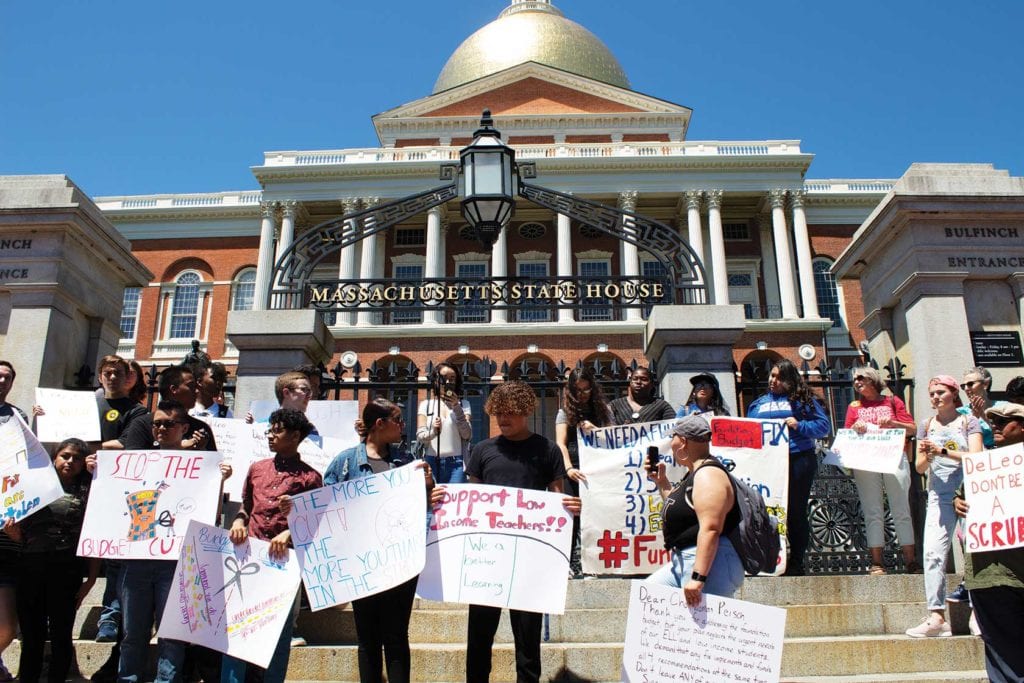
Educators, students and parents gathered in front of the State House last Thursday, July 12 to protest the continued underfunding of public education, particularly for English language learners and students from low-income households.
Organized by the Massachusetts Education Justice Alliance, more than 100 protestors took part in the ’90s-themed demonstration, which began on the State House steps at 1 p.m. with speeches from students, teachers and advocates.
“This is a crisis,” said Charlotte Kelly, MEJA’s executive director. “It’s a crisis when every year we underfund our schools by $2 billion.”
Underfunding of public schools was uncovered by the Foundation Budget Review Commission in 2015. The foundation budget modernization bill, passed by the Senate two months ago, was the first action taken by the Legislature in the three years since the commission gave its recommendations.
Yet, Kelly and other education justice advocates say the bill that passed unanimously in the House on July 11 falls short of the budget’s intended goal — to provide equal education opportunities across the state.
“They’ve left two of the most important racial justice elements out of the bill,” said Kelly.
Those elements include guaranteed funding for English language learners and low-income students. Such children tend to live in urban centers, like Boston and Lowell, where schools struggle to find funding and children are often from ethnic minorities or low-income households.
Among several personal stories shared during last week’s demonstration, a teacher from Peabody spoke about how the House bill will severely limit the quality of education for the majority of his students. Fifty-three percent of those in his math class are English language learners.
Other alarming accounts of decaying school buildings, lack of resources and staff shortages were clear signs of chronic underfunding across the state.
Senator pushes back
Sen. Sonia Chang-Diaz, chair of the Joint Committee on Education and a member of the review commission in 2014 and 2015, stood on the steps to question the House’s decision to remove this funding, despite verification and complete support from the committee and the Senate.
“How long are we going to ask poor kids to wait while we do study upon study?” she asked the crowd.
The foundation budget was first set in 1993 and was intended to eliminate funding disparities between urban and rural districts, caused by varying levels of property tax income, the main source of school funding. The budget formula, used to calculate how much a school can spend and how much the state should contribute, was meant to be revised annually but has not been updated since the early 1990s. Because the formula did not account for the increased cost of health care for school employees and the increased number of English language learners and students with disabilities over the last 25 years, the formula is estimated to shortchange Massachusetts school districts by as much as $2 billion a year.
Christine Langhoff, a retired teacher from Boston, called the abandonment of these provisions a “dereliction of duties.” She said she thought some representatives are hesitant to support these funding measures for fear of upsetting their base so close to the upcoming elections.
Andre Green, chair of the Somerville School Committee, spoke to the crowd about how Somerville improved the quality of their public education services.
“It’s not complicated,” he said. “We spent a lot of money.” While he acknowledged that they were in a privileged position to have the cash, he said it was no longer an excuse for legislators to simply say they can’t afford it.
“Schools are not failing — we are failing schools,” Green said.
In homage to the ’90s, protestors brought out their skateboards and threw on their best flannel shirts. They made sure representatives in the State House heard their chants of “Education is a right, not just for the rich and white.”
After an hour the crowd headed into the State House to hand-deliver letters of complaint, and to ask DeLeo and House representatives to support Rep. Aaron Vega’s amendment to the foundation budget bill, which would reinstate the missing funds.
Vega later withdrew the amendment. The Senate reinstated its version of the bill, which is now in conference committee.






